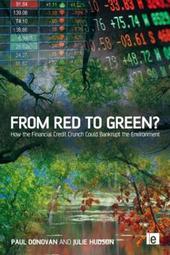
|
From Red to Green?: How the Financial Credit Crunch Could Bankrupt the Environment
Hardback
Main Details
| Title |
From Red to Green?: How the Financial Credit Crunch Could Bankrupt the Environment
|
| Authors and Contributors |
By (author) Paul Donovan
|
|
By (author) Julie Hudson
|
| Physical Properties |
| Format:Hardback | | Pages:256 | | Dimensions(mm): Height 234,Width 156 |
|
| Category/Genre | International economics
Environmental economics
The environment |
|---|
| ISBN/Barcode |
9781849714143
|
| Classifications | Dewey:333.7 |
|---|
| Audience | | Postgraduate, Research & Scholarly | |
|---|
| Illustrations |
black & white illustrations
|
|
Publishing Details |
| Publisher |
Taylor & Francis Ltd
|
| Imprint |
Earthscan Ltd
|
| Publication Date |
5 August 2011 |
| Publication Country |
United Kingdom
|
Description
Written by an economist and an investment professional, this book addresses the twin crises that the world is facing in the form of a simultaneous financial and environmental credit crunch. Financially, consumers are less able to consume now, and pay later. Environmentally, we may have already reached our credit limit and the bill for past financial and environmental consumption is falling due. Whether the financial credit crunch constrains consumers in a way that will be environmentally supportive, naturally slowing the consumption of finite resources, or hinders any effective resolution of the environmental credit crunch is of crucial importance. Policy responses to the financial crisis are likely to be constrained by the political need to support the economic status quo, and when combined with a global reduction in available investment capital there are serious challenges ahead if the economic and environmental damage of the environmental credit crunch is to be minimised. This book asks whether financial crunch-induced changes in consumer behaviour will be enough to avoid, or reduce, the environmental crunch many believe is just round the corner. Donovan and Hudson combine their respective economic and environmental perspectives to address this key question, reviewing this 'tale of two crunches' from the perspective of different economic sectors. The answer to the conundrum this book poses may lie in the only unlimited resource on the planet - human ingenuity.
Author Biography
Paul Donovan joined the UBS in 1992 and is a Managing Director and Global Economist. Paul is responsible for formulating and presenting the UBS Investment Research global economic view, drawing on the bank's world-wide resources. He co-authors the Global Economic Perspectives publication with the other members of the Global Economics team and has focused in recent years on income inequality, monetary union and currencies, government policy, and monetary economics. The UBS macro economic research philosophy is to draw on micro level corporate information, and combine it with macro level analysis and data to provide a consistent view of the global economic outlook. Paul regularly appears on the CNN, Bloomberg TV, and CNBC television stations. Julie Hudson, CFA, is a Managing Director of UBS, where she heads up the Socially Responsible Investment product established by UBS within its Equity Research division in 2004. The team launched UBS publications on climate change in 2007, on corporate governance in 2008, and on ESG (environmental social and governance issues) and their impact on competitive markets in 2010. Earlier in her career she led the Customized Research group, and, before that, was a Global Sector Strategist. She has a particular interest in the interaction between markets and their surrounding context, and believes that 'social' issues cannot be separated from 'mainstream' corporate strategy and risk-control therefore they will regularly be encountered in the context of portfolio management and financial analysis. This argument is put forward in a publication, The Social Responsibility of the Investment Profession, Research Foundation of CFA Institute, August 2006.
Reviews'Donovan and Hudson's original and highly readable book clearly identifies the true cost of living beyond one's means. Their analysis of how environmental problems are influenced by today's economic challenges offers a fresh insight for policy makers.' - Rt Hon Danny Alexander MP, Chief Secretary to the United Kingdom Treasury 'This thoughtful and timely book is an essential read for policy-makers, business leaders and investors who have the power and influence to determine whether we can survive the environmental crunch.' - Emma Howard Boyd, Head of Socially Responsible Investment and Governance, Jupiter Asset Management "This highly topical book brilliantly pulls together the two major global challenges of the day - this is essential reading for financiers, policy makers and environmentalists alike." - Professor Sir David King, Director of the Smith School of Enterprise and the Environment (Oxford University)aaa
|